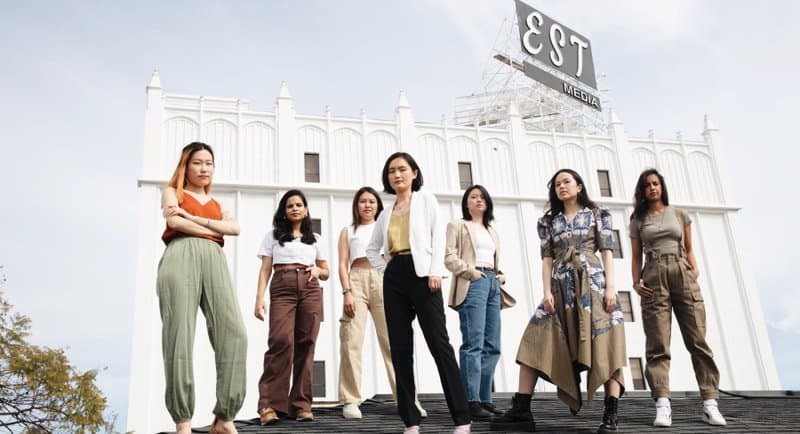Eastern Standard Times (EST) – a new global media platform that shares stories from Asia to the world – has officially launched in Australia.
The publishing network produces original, short-form, premium web content and sets out to challenge and celebrate narratives about Asian people and culture, fostering a borderless community for Asian youth across Australia and the wider world.
Despite Asians making up 16% of the Australian population, this statistic is not reflected in newsrooms with only six per cent of presenters, commentators and reporters coming from an Indigenous or non-white background.
Editor-in-chief Keshia Hannam said: “The Asian narrative in Australia is too often controlled by media entities that don’t live, understand or embody the nuances that make up Asian culture. With Eastern Standard Times, we are providing a platform that recognises Asia is not a monolith, but that we share many unifying traits that deserve more visibility. When it comes to reporting on stories about Asia in Australia, it’s important that they are told by people who have lived them and that starts by shaking up what newsrooms look like, and what qualifies as a ‘good’ story pitch.”
EST boasts an all-Asian editorial team based in Sydney, Los Angeles and New York, with production teams spread across Australia, and Asia, in countries like China, Indonesia, Singapore, and Hong Kong. At its helm is Hong Kong-born, Australian-raised Hannam as editor-in-chief, bringing over a decade of experience in media, having worked with Fortune, National Geographic, Forbes, CNN and Vogue.
Leading Australian production are producers and twins Andrew Yee (previous collaborations have included with The Art Gallery Of New South Wales, The National Gallery of Victoria, 4A Centre For Contemporary Asian Art and Korean Cultural Centre) and Chris Yee (former work has included for some of Australia’s best-known brands including VIVID Festival Sydney, Apple, Sony Australia, Vans, and Estée Lauder).
In light of the recent election, EST’s Australian debut content piece looked at the doubling of Asian representation in Parliament highlighting wins from six Asian candidates who claimed victory. Other episodes released this week include a profile on Thai-Australian playwright Anchuli Felicia King who is dissecting intra-Asian politics and corporate greed, and a segment on South East Asian fronted band ‘Gang Called Speed’ who are changing the face of Sydney’s hardcore season.
EST’s’ Content Series include:
• Mini Docs: Micro-documentaries told from the point of view of a protagonist steeped in the story. Episodes so far include ‘The Young Women Building Kyrgyzstan’s First Satellite’, and The 24 Year Old Australian Who Ran a $140M Ponzi Scheme.
• Uncovered: Archival-forward anthology series of Asian crime leads such as ‘Malaysia’s Murderous Witch Doctor’ and ‘How Hong Kong Gangster Cheung Tze Keung Ransomed Billionaires For $300M’.
• Icons: Animated stories of Asian legends, such as BTS and Faye Wong, Asia’s Beyonce
• Explains: Host-led current affairs explainers on Asian news stories which has covered topics such as ‘The Fall of Aung San Suu Kyi Explained’ and ‘Ultra Fast Fashion Destroys The Planet & Asian Lives’
• Selects: Curated documentaries from up-and-coming Asian filmmakers on topics such as Indomie Instant Noodles and Yellow Peril: Queer Destiny about slayasian sensations House of Rice
• Reports: Fast-paced, short-news videos focused on permeating social media with urgent news items relevant to Gen Z from Asia, such as “Asian Representation in Australia Just Doubled” and ‘Record Setting Heatwave in South Asia Is A Bad Sign’
• Studios: A collaboration between EST’s publishing and film & tv departments, short docs are edited from longer running features, such as Hidden Letters: The secret language of Nushu, that just premiered at Tribeca Film Festival 2022
• Micro Docs: Short docs under five minutes about the often overlooked issues in Asia and throughout the diaspora, such as My Black and Brown Love Story and Vietnam’s Pole Dancing Merman Quan Bui
Hannam continues: “We are increasingly bearing witness to how social media has upended storytelling, and many are becoming more aware of how biassed Western media can be – a cry that many activists and storytellers have uttered for a long time. That’s why our mission is in the name: to make the East standard – as common as the Western lens.”
“Through our global network of content creators and a one-of-a-kind editorial team, we are uniquely positioned to portray a great breadth of exceptional human-interest stories accurately and thus powerfully. Our hope is to build a bridge from East to West so that Asian youth in Australia see themselves reflected in global media stories – something we never saw growing up as third (fourth, fifth) culture kids.”
Eastern Standard Times is a subsidiary of EST Media Holdings, an “Asia to the world” media group founded in 2021 by Jaeson Ma (Triller, 88rising, Stampede Ventures) and Eric Tu (VICE, Anonymous Content). It sits alongside EST Studios, an independent production and sales company which specialises in premium film and television series from Asian creators, and OP3N, a launchpad which makes Web3 accessible through tool consolidation.
EST co-founder and chairman Ma commented: “For too long, the West has dominated the media narrative. The trio of media companies under EST Media Holdings – including Eastern Standard Times – bring about an Asian-led entertainment and narrative reclaiming renaissance.
“Asian excellence in storytelling and content production has always existed. Now it’s time that it’s given a global stage,” he added.
Content drops three times a week on easternstandardtimes.com, as well as TikTok, Instagram, Twitter and Facebook, and is currently free to view. EST Media Holdings has received investment from key firms driving the future of media and community, including Galaxy Interactive and Blue Run Ventures.
–
Top image: Joy Jeong (S Korea), Manal Ahmed (Pakistan), Maggie Teng (Taiwan), Ruolin Luyo (China), Ella Chi (China), Stephanie Tangkilisan (Indonesia) and Keshia Hannam (Australia/Hong Kong/India)
